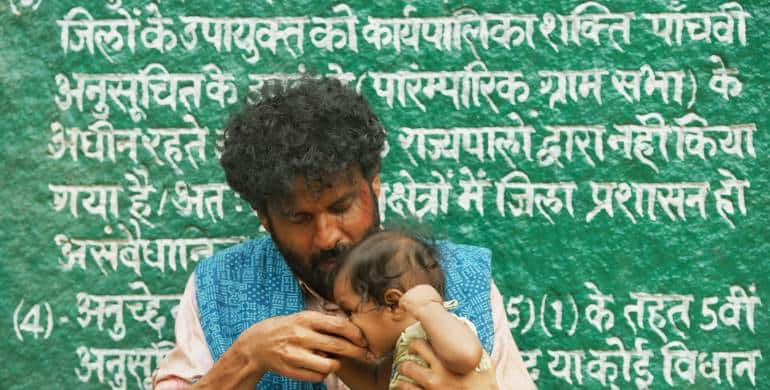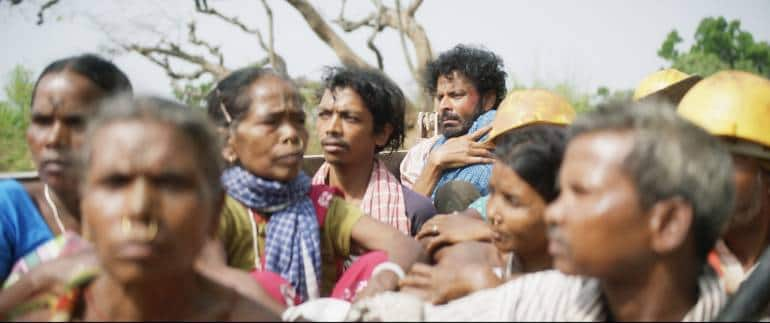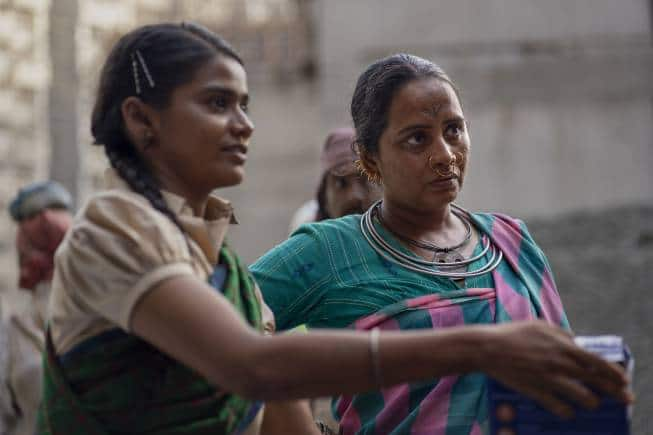




Pindare polasher bon, a popular Bengali folk jhumur song is refashioned as Dasru (Manoj Bajpayee) sits, swings, and sings with his wife Vaano (Tannishtha Chatterjee) in their idyll, Jhinpidi, a fictional village in Jharkhand. As the song and Vaano leave the frame, the camera stays static on an old-growth tree trunk. A foreshadowing of an impending loss of the Adivasi legacy. Orange of the forest’s palash flowers morphs into a construction worker’s uniform in Mumbai’s concrete jungle. Dasru is weighed down by heavy cement bags and his own circumstances. Joram gives a thriller twist to the age-old story of tribal displacement. Wars are fought over land, a genocide is unfolding in the West Bank as closer home, Manipur burns — the destiny of the modern man is displacement, it’s a reality the “eternal outsider” Devashish Makhija lives with, a Sindhi (with roots in Pakistan’s Sindh) who grew up in Calcutta and lives in Bombay.
When Zee Studios asked Bajpayee if he had a project he’d like to work on, he plonked Joram’s script on the table and said, “Meet Dev”. The manhunt revenge thriller Joram, which premiered in the main competition of the prestigious International Film Festival Rotterdam (IFFR) in February and travelled to all big festivals, is director Makhija’s third outing with Bajpayee (after Taandav, 2016; Bhonsle, 2018), and it is their first film together to release in theatres today.

Manoj Bajpayee as Dasru with Joram in the film.
“There is no denying the fact that Bajpayee brings a certain security and eyeballs to a project. After Family Man (2021), everybody wants to work with him. He’s had a long-standing relationship with the studio (Zee),” says Makhija, 44. Over the last three decades, Bajpayee has played everything, from an Everyman, scourge, arbiter to the oppressed with equal élan and honesty. In Joram, Makhija makes the Adivasi man run, with his three-month-old daughter, who gives the film its title. Unlike Makhija’s previous films, where the avenger’s name becomes the title and revenge the end goal, the hero, here, is a guardian, custodian of the indigenous (his daughter and the Adivasi identity and legacy), running away from the malice of the modern world. But, will it be a free run?
“This film has left me a little shifted, I’ve moved away from an Ajji,” says Makhija, whose films reflect his rage against the machine. Joram is layered and accessible. Its inward meditation on morality versus justice is cogent, there’s exactitude but also tender regard and dignified outrage. “The film has a slightly more balanced perspective and is slightly more accessible — the emotion of a father trying to run to protect his little daughter is universal and relatable,” Makhija adds.
World-building
He may not have Adivasi roots, like Chhatrapal Ninawe, whose Berlinale-premiered Gondi tribal thriller Ghaath/Ambush is screening at the International Film Festival of Kerala (December 8-15), Thiruvananthapuram, but a disillusioned-from-rejection Makhija went and lived among the Dongria Kondh people, travelling through Odisha’s jungles. The tribe shown in the film is fictional, drawing elements (tattoos) by mixing many tribes, including Dongria Kondh. He tried the mix-and-match in his short film Cycle, too, “I’m not a tribal and I would never claim to know anything that would be remotely close to an insider’s perspective”. Even the name of the village, Jhinpidi, is fictional. The dialect they speak is fictional, created out of a mix of five-six dialects, including Jharkhand’s Nagpuri, and brought closer to Hindi, to avoided subtitling.
“Almost all the things that this script tries to say I picked up from those travels, there are these little truths, like farmers going to village bazaar to sell their murgi (roosters) and getting Rs 200 a day to do rolling work is something I would not have known sitting in the city,” he says. Joram was shot in Ranchi, down to the south Jharkhand-Odisha border, “in a frighteningly dystopian mining town, with a layer of dust hanging all over it that you can’t see beyond 20 metres.”
Double bill
Joram and Makhija’s unreleased Oonga make a double bill. Joram’s script was written seven years ago, after his first film Oonga, which, turned into a Young Adult novel, won the 2021 Neev Book Award. “For me, Oonga was a travesty. It wasn’t made the way I wanted it made. I wrote Joram almost as a response to the film that Oonga could not be.” If Oonga wants to be like Avatar’s (2009) Lord Rama-like Na’Vi, Dasru — like Apocalypto’s (2006) Jaguar Paw fighting to save his Mayan civilisation’s demise — will run and fight his own to save his family, progeny and community’s future. Will Durant’s quote, with which Apocalypto begins, foments the universe of Joram: “a great civilisation is not conquered from without until it has destroyed itself within.” Dasru’s run is also from his adversary and his old self, to impede that internal destruction, of the self, his kin and his lot.
Visible from the very first scene is the ingenuity of the 2023-National-Award-winning editor Abhro Banerjee (Rafeeq Ellias’ documentary, If Memory Serves Me Right, 2021). Banerjee does a thoughtful Edward Scissorhands job, sandpapering Makhija’s wrath, and shows us actions leading up to or in the aftermath of violence. Cinematographer Piyush Puty pits image against image, as the film pits word against word and idea against idea to win the viewer over to one’s cause.

A still from 'Joram'.
Makhija wanted the film to get politics into its DNA and yet not make it difficult to access. Something like Son of Saul (2015), which “doesn’t ever leave the main protagonist. It bypasses the obvious politics to focus on the character’s emotions. So, there’s a lot of handheld shots and long takes. The political should not eclipse the emotional.” Another inspiration was Alejandro González Iñárritu’s Biutiful (2010). Makhija isn’t a film buff he says, literature’s pull is greater, of Ernest Hemingway, and Dashiell Hammett’s smartly written crime thrillers: gunshot sentences, cliffhanger page turners.
When Makhija got the call from Zee’s creative head Ashima Avasthi, co-producer on Joram, the rejection-veteran (18 shelved films) was cynically surprised. That a big studio like Zee Studios backed the film, “allowing it to be what it wants to be, the journey it seeks to take, without interference…is no less than a miracle… It was the biggest work we ever had done. It has scale that we’ve never operated at (a cast and crew of 250 people).” The huge crew shot in peak Jharkhand summers (50 degrees Celsius) near iron ore mines. “This film was an attempt to step out of an echo chamber, to speak to people outside of that same small circle of people who agree with what I have to say. This was a conscious effort from the scripting stage,” he says.
Stroke of luck: Lady villain
The one fundamental change Makhija made of his own accord — a stroke of luck no one could have predicted — was a last-minute pre-production switch from a male antagonist to a female nemesis. Smita Tambe, the daughter-in-law from Ajji, is unrecognisable and arresting in her villain act as a housewife-turned-Jharkhandi politician. Tambe’s Phulo Karma — in a hair-raising performance, with an electrifying screen presence, drawing our gaze away from Bajpayee — is not a femme fatale, she’s a wounded tigress out to avenge the kill of her own, along with her sidekick Bidesi (Megha Mathur, of Jhini Bini Chadariya) in tow.

Megha Mathur's Bidesi (left) and Smita Tambe's Phulo Karma in Joram.
“The motivations are universal, a man in place of Phulo Karma would be operating from ego, from a sense of wanting to show that he is more powerful than the other person. She is only operating from thwarted maternal instinct,” says Makhija.
The women characters make a teleological break in how the genre has been presented and consumed over time. When he wrote the script initially, his world had mostly male characters, “because that’s what cinema has shown all these years. But having had made an Ajji and a bunch of short films where I was also, in the last few, trying to explore gender in whatever limited way I could, I saw a chance here to expand my own understanding of normalising the presence of women in roles and spaces that otherwise is seen as so masculine.” It took COVID-19 and a three-week lockdown for Makhija to scratch out and redraw the script by bringing in all the women characters.
“Wherever I could, I injected women characters and their perspectives. That somewhat brought rounded and more mature perspectives to the otherwise blinders-on macho men who are just running about and causing mayhem. It’s very easy to fall into the trap of those tropes. Ajji is broadly a rape revenge, and this (Joram) is man-on-the-run crime thriller, with a cop chasing him,” he says.
The women, even in the cameos, make a world of difference to what could have been a testosterone-heavy film, they keep the adrenaline high and pace intense while breaking the tropes and archetypes. Cop Ratnakar’s wife (Rajshri Deshpande) is seen in a mobile phone ratio frame, she is accessed only through Ratnakar's (Mohammed Zeeshan Ayyub) iPhone, each time she calls to check on him, “she was that little dimension to the character which would have otherwise just been one more typical cop chasing a man on the run.” The domestic pulls are neither neglected nor cause a digression from the mad chase.
Us versus Them
It’s evident that Vaano is disapproving of Dasru’s association with the Naxals or when he’s holding Madvi, she gives him a look and goes away, and turns away her face from him at night. There are no conversations or discussions between the two. She toes along Dasru. “When I travelled in the conflict areas, I witnessed that the tribal folks are very fatalistic, man or woman, they surrender to their circumstances easily, unless they choose violence. Because they are genuinely non-confrontational, they don’t want complexities or radicalism. So, Dasru and Vaano don’t take much time to surrender to their decisions,” says Makhija.
The moral ambiguity in this film brings a subliminal balance, fades out any polarity. Each is justified in his/her action. “Moral ambiguity, both exciting and difficult to do, like in a Tarantino cinema, is something I really aspire for in my work and enjoy in the films I watch, the simplicity of the morality gets dull after a point,” he says.
The mines are the Naxal hotbeds. While they didn’t shoot in the mines, they passed through active red corridor in Chaibasa. Local line producer Sanjeev Verma helped navigate the mines, securing the permissions from local authorities and the CRPF. An inherent irony underlie the making of such films, of having to navigate the system and take the system’s help to tell a story that questions it. And that’s where Joram scores, it doesn’t point fingers at but reflects on. The crux of the film is captured in one dialogue: “Which uniform to trust?” A guileless people stuck between a rock and a hard place, between the State (police/CRPF) and the revolutionary (Naxals).

Mohammed Zeeshan Ayyub as the cop Ratnakar in Joram.
Mohammed Zeeshan Ayyub, who, for long, has deserved to play the hero, but Bollywood refuses to look outside the windows of its crystal mansion. Zeeshan gets a meaty role as Ratnakar, a good cop coerced by the system, to chase and catch Dasru. With grace, gravitas and restraint, he makes you feel for the person beneath the uniform. For the role, Makhija had in mind his go-to, reliable actor Abhishek Banerjee (Ajji, Bhonsle), whose dates weren’t available (perhaps, he was busy with Karan Tejpal’s Venice-premiered mob-lynch-chase thriller Stolen, which also premieres at the Mumbai Film Festival). “Zeeshan was my discovery on this film, my epiphany on this field, because the others I have worked with before,” says Makhija. Zeeshan is Banerjee’s college senior. Once Zeeshan was signed, Makhija “started seeing this character in a slightly different way, because I had not imagined that body language, that face, that demeanour. Zeeshan brought a lot of himself into the character, the little nuances that you see are all him. Because there was no time to prep with him.”
“Even if a well-meaning officer wants to go out of his way to do something, the system itself is calibrated in a way where you can’t do something beyond a certain capacity. There are so many perspectives on the field that even 10 films cannot do justice to the multiple perspectives we found,” says Makhija. While the rural, landless, illiterate scapegoat Dasru, distanced from the access to structures of citizenship is the obvious Spivakian subaltern, Ratnakar is the classic subaltern, lower in power ranks, the perfect stooge. Not speak, Makhija makes the subaltern run. Shows a flicker of hope and redeems the male characters, who aren’t boring macho cut-outs but conflicted, vulnerable, caring and flesh-and-bone real. Their weakness is their greatest strength.
“This film has had a karmic journey; it’s become an organic thing. It also has been a very difficult film to make for both (co-producer) Anupama (Bose) and I. We’ve put every last drop of our blood into our first film together,” says Makhija, “I don’t think the anger inside me has gone away or changed. As a person, I feel shifted. But I don’t know what this will lead to.”